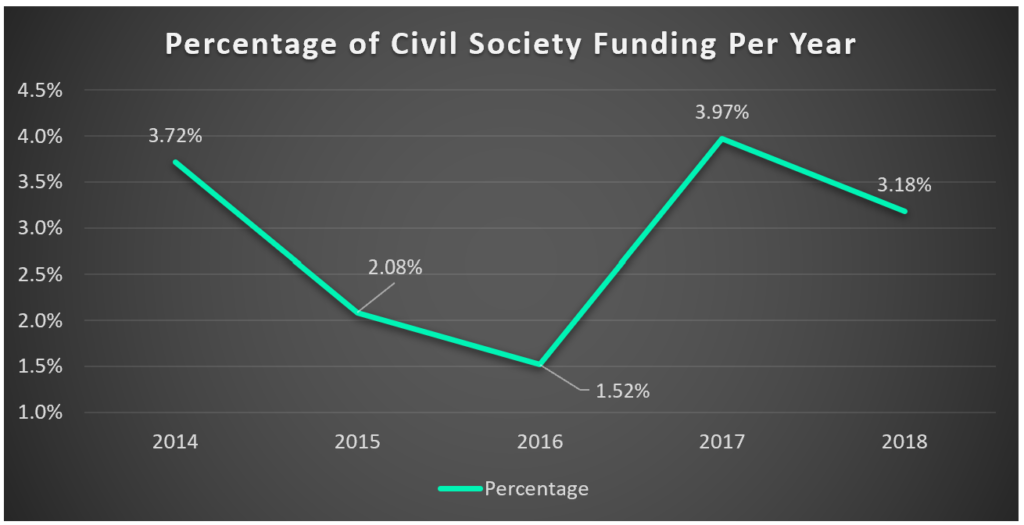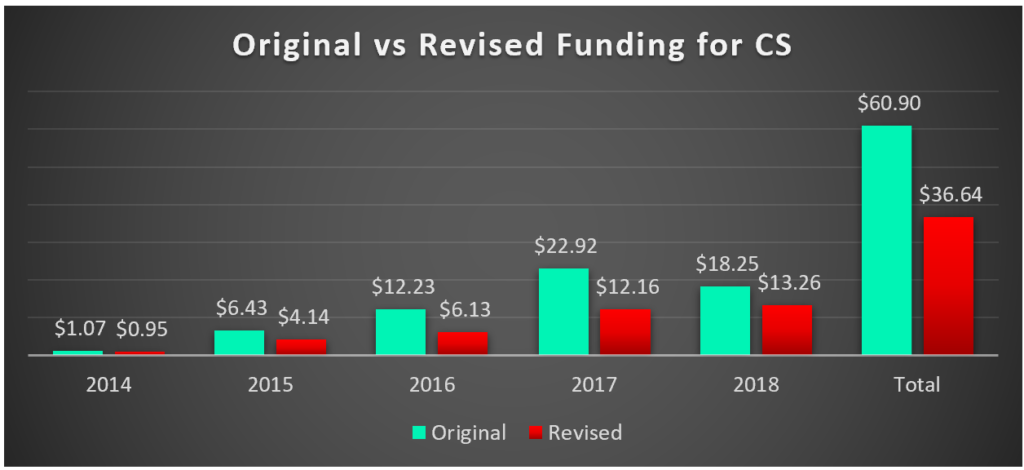
Tax Justice Network ■ Donor countries’ tax funding for civil society barely half what is claimed

Guest blog: Richard Christel, Program Associate at Transparency and Accountability Initiative
Recently, Transparency and Accountability Initiative was asked to prepare a presentation for a Tax Justice Network organised convening bringing together civil society, private foundation, and public aid agency participants. The focus of the presentation was on civil society funding for domestic resource mobilisation (DRM) efforts. Our research confirmed the challenge of getting reliable data on current level of support, but also brought home the limited levels of funding for non-state actors on tax. Given the bleak fiscal picture for countries around the globe exacerbated by responding to the coronavirus pandemic, mobilising engagement of all stakeholders in support of equitable and accountable tax system is all the more important.
Tax reform and subsequent revenue raising will be key in the recovery effort and now more than ever, civil society must be involved in reform discussions. If you are not at the table, you are on the menu. Civil society can play an active role in working with policymakers and tax authorities to remove inequities in current tax policy and administration and raise revenues for development priorities as the TAI-commissioned report on civil society engagement in tax reform points out, “CSOs tend to play three broad roles in tax debates, often in combination: analysis of tax policy, advocacy for or against policy proposals, and awareness raising on tax rights and obligations.”
Of course, civil society can only do this if they have resources to engage effectively.
A drop in the bucket
Previous research has confirmed that civil society funding for domestic resource mobilisation is indeed low – in both terms of absolute funding and as a percentage of domestic resource mobilisation efforts.
But exactly how low is it?
To answer this question, we examined data from the OECD Creditor Reporting System (CRS) in April. We examined gross disbursement data from 2014 to 2018 from all official donors in sector code 15114 (domestic resource mobilisation). This data isn’t perfect and isn’t totally complete, as it lacks some European Commission funding, but of available datasets, it is the most complete and easiest to use.
Overall, civil society funding for domestic resource mobilisation has been on the upward trend, starting off at (2018 USD prices) $950,000 in 2014 and ending at $13.26m in 2018. Compare this figure to funding for public sector institutions, $10m and $260m in 2014 and 2018 respectively. As a percentage of all reported domestic resource mobilisation funding, civil society has received on average only 2.72 per cent of funding from 2014-2018. Of course, no one is arguing for parity in these numbers. Civil society cannot collect taxes or establish a tax administration office, nor can it issue subpoenas or conduct audits. However, given the importance and value of funding civil society efforts on domestic resource mobilisation, these are strikingly low figures.

Reporting Woes
However, this isn’t the full story.
When countries signed on to the Addis Tax Initiative (ATI), they pledged to increase funding for domestic resource mobilisation efforts. Part of this commitment is to report data on disbursements and countries do so when they report official aid statistics to the OECD and the Addis Tax Initiative. Unfortunately, we found anomalies in the data across reporting mechanisms.
One such anomaly was quality control in reporting. For example, one country government marked more than $10m in funding to the Kenya Revenue Authority as civil society funding, which appears a mislabeling. When we account for such apparent reporting glitches, this government’s civil society funding dropped from $16.49m from 2014 -2018, down to just $520,000 over the same period.
Similarly, for another donor government what was labeled as technical assistance to national and subnational government was categorized under civil society support. Upon recategorization, the civil society support drops from $3.5m to $100,000.
Indeed, original Creditor Reporting System data indicated civil society funding being $60.9m from 2014-2018. Upon closer analysis, I suggest that a more accurate figure is $36.64m, a difference of $24.26m.

Perhaps the targeted end users for these original disbursements were for civil society, however we could only analyze publicly available data.
Compounding the challenge of an accurate overview are differences between different data sources. For example, the Addis Tax Initiative’s public domestic resource mobilisation database lists the Netherlands as having two total project disbursements in 2016, while the OECD data has six. Simultaneously, the Addis Tax Initiative 2016 data source lists the Netherlands having 11 projects, of which 6 had USD amounts extended. For their part, the Addis Tax Initiative says “…the data used in the DRM Database consists of OECD DAC data adjusted for the purpose of the ATI monitoring exercise.”
However, we don’t know the basis for differences between the two datasets. There is also value in having timely data available – currently the Addis Tax Initiative database only has data from 2015-2017 available.
Given that TAI members report grants data to the Secretariat annually, we try to create an accurate sense of domestic resource mobilisation funding from our members. However, finding an exact dollar amount for civil society domestic resource mobilisation funding is difficult due to some funding being core support to grantees working a range of issues including domestic resource mobilisation and as such isn’t broken down.
The Window
Investing in domestic resource mobilisation strategies now is what will help alleviate financial pressure and increase fiscal sustainability in the long run. Care should be taken however, to avoid levying regressive taxes on an already battered populace. A well-resourced civil society can garner political capital and harness citizen anguish to push for more progressive taxation, help assure that multinational corporations and the wealthy pay their fair share, that loopholes do not favour the well-connected, and in turn bolster treasuries and limiting more financial strain on the poorest. These initiatives can strengthen public budgets and help ease, however slightly, the economic devastation that is sure to linger.
But of course, that is only if organised civil society is left standing. As the next round of the Addis Tax Initiative begins to shape up, let us support taxation and civil society with dedicated targets of support to assure equitable and accountable tax systems and sound reporting to back it up.
Related articles

The secrecy enablers strike back: weaponising privacy against transparency
Privacy-Washing & Beneficial Ownership Transparency
26 March 2024

Ireland (again) in crosshairs of UN rights body

Tax policy and gender disparity: A call to action on International Women’s Day 2024

Policy research conference: How a UN Tax Convention can address inequality in Europe and beyond

The IMF’s anti-money laundering strategy review is promising, but it all comes down to implementation

Inequality Inc.: How the war on tax fuels inequality and what we can do about it
Proposal for ‘Business in Europe: Framework for Income Taxation’ (BEFIT): A wrong turn in the right direction
2 February 2024
Formulary apportionment in BEFIT: A path to fair corporate taxation
31 January 2024


